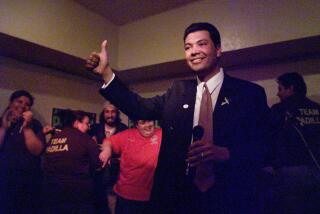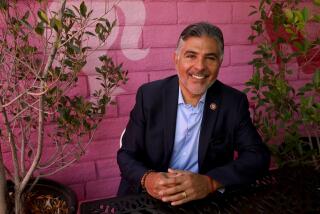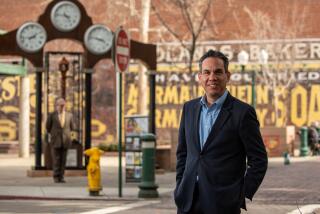Army Secretary Caldera Goes on the Road to Lift Morale, Expectations
EL PASO, Texas — Row upon row of toughened soldiers, sitting stiffly in their crisply ironed camouflage uniforms, listen politely as Army Secretary Louis Caldera lays out his goals.
“I want to send the message to soldiers that we want them, need them and appreciate the things they do,” Caldera told the students at the Army’s Sergeants Major Academy, offering a pat on the back many in the service feel is long overdue. “We want to keep good soldiers in the Army.”
In a series of low-key visits to Army installations around the world, Caldera has embarked on a morale-boosting campaign for a service stressed with budget woes, continued overseas deployments and frayed combat capabilities.
“We are stretched to the limit,” the service’s top civilian tells the soldiers, pledging to fight for increases in the Army budget and to address concerns about pay, health care and their children’s schools.
In recent weeks, he’s become less formal when addressing the troops and civilian supporters of the Army. During his travels to Army bases, he doffs his suit jacket as he tries to make a connection with the troops.
“It’s nice to know that there’s somebody out there to back us up,” said Staff Sgt. Michael Bejcek, a power engineer who briefed Caldera about his work with the THAAD antimissile system at nearby Ft. Bliss. “He’s about the most important person we’ve had here.”
Visits More Than 2 Dozen Bases
During his first six months in office, Caldera has addressed about 25,000 troops, visiting more than two dozen Army bases and almost a dozen countries. Over Thanksgiving, Caldera shared turkey with Army soldiers in South Korea.
Caldera’s brief stop here--his birthplace--was welcomed by more than the troops. Born to immigrant Mexican parents who later moved to Whittier, Calif., Caldera easily fielded questions in Spanish and English for local reporters.
After graduating from high school, Caldera earned a slot at West Point, spent five years in the Army, went on to Harvard law and business schools and later served in the California legislature.
Now, at 42, the onetime military policeman oversees an annual budget of $59 billion, 1.2 million uniformed and civilian employees and military bases that span 25 million acres.
In an interview aboard his Army jet, Caldera described himself as “the civilian face of the Army for the American people,” the individual who spans military and civilian worlds.
“I learned from my parents what civic responsibility is--that you give something back to your country. . . . I want to make sure we are bringing the right people into the Army, and that the Army is getting the resources that it needs,” the secretary said.
The White House has taken advantage of Caldera’s background, with President Clinton appointing the secretary as his personal representative for the recovery effort in Central America in the wake of Hurricane Mitch. Caldera has traversed Nicaragua, Honduras and Guatemala to help organize the military’s distribution of relief goods and millions of dollars in aid.
“He forged some very effective relationships with some of the national leaders in Central America,” said Gen. Charles Wilhelm, the commander in charge of U.S. military activities in Central and South America.
“It’s been a great help, having someone of his stature to go into the region,” said the four-star Marine general.
Caldera came to Washington with Clinton’s Corporation for National Service, which provides stipends for public service work.
He was recommended for his post by Sen. Joseph Lieberman (D-Conn.), a member of the Senate Armed Services Committee. The two men met at Democratic political functions in California. “His life story is an inspiration,” the senator said of Caldera.
After Caldera was interviewed for the Pentagon post, the senator recalled, a senior Pentagon staffer called Lieberman to say, “This guy’s a star!”
“And it’s true--he really believes in national service. He’s a great role model, policymaker and morale builder. . . . He’ll be a very effective leader,” Lieberman said.
Heading a service can lead to higher political office. Two previous Navy secretaries, John Chafee of Rhode Island and John Warner of Virginia, now sit in the Senate.
Some of Caldera’s supporters are reportedly touting him as a possible vice presidential candidate.
Retired Gen. Gordon Sullivan, a former Army chief of staff and now president of the Assn. of the U.S. Army, said Caldera acts as a crucial bridge between the military service and Congress.
“He represents a completely different dimension . . . and that carries over to Capitol Hill. He is of the party, he is part of that chain of civilian leadership within our government,” Sullivan said.
Caldera said he’s aware that after 14 years of sliding military budgets there is a mood in Washington that may provide the Army several billion additional dollars for repairing aging weaponry and bases, as well as improving military pay and retirement.
“The United States is the only superpower in the world, and we have a leadership role,” Caldera argues. “We have been pressed to do more with less. We have to squeeze every cent out of our dollars, be more businesslike in our approaches. . . . It is critical to the national security of our country.”
More to Read
Get the L.A. Times Politics newsletter
Deeply reported insights into legislation, politics and policy from Sacramento, Washington and beyond. In your inbox three times per week.
You may occasionally receive promotional content from the Los Angeles Times.










